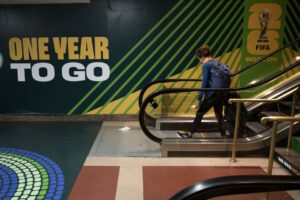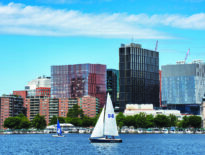
A wall at Boston's South Station was repainted to bear a new message reminding the region that the 2026 men's World Cup is on the horizon. Photo by Chris Lisinsk | State House News Service
Take this as either an advertisement or as a warning: next summer will be like no other.
In a six-week span starting in June, Massachusetts will celebrate the 250th anniversary of July 4, 1776, host seven men’s World Cup matches, and welcome dozens of tall ships back to the waters around Boston for the first time in nearly a decade.
That combination, in the mind of the state’s tourism chief, is “unprecedented.”
“It is certainly a once-in-a-generation opportunity,” said Massachusetts Office of Travel and Tourism Executive Director Kate Fox. “I can’t think of a time when all of these things have happened at once.”
The convergence of one of the most iconic international sporting events, a multi-day nautical showcase and a historical milestone is forecast to bring millions of people to Massachusetts and generate more than $1 billion in economic impact, all on top of the typical summer swell the region typically enjoys.
A Steady Drumbeat of Events
The events will be somewhat staggered, fueling a stretch of megatourism rather than a more concentrated period with everything happening at once.
On June 13, 2026, Gillette Stadium in Foxborough will host its first match of the 2026 men’s World Cup. That will be the opening salvo for a summer of celebration, and five more group-stage matches will follow over the subsequent two-plus weeks.
Then, Boston Harborfest will run from July 1 to July 4, culminating with an Independence Day celebration – always a buzzy day in Boston thanks to the fireworks show along the Charles River Esplanade scored by the Boston Pops – that marks a quarter-millennium since the Declaration of Independence was adopted.
Gillette will host one more soccer match, a quarterfinal on Thursday, July 9 that will send one nation forward and one other home. And two days later, with white sails billowing in the wind, roughly 75 massive ships will anchor in Boston Harbor.
The soccer matches will be the first on American soil for a men’s World Cup since 1994, and the first for either a men’s or women’s World Cup since 2003. They will also be the first men’s World Cup matches ever hosted at Gillette Stadium – the six matches held in Massachusetts in the 1994 iteration took place at Foxboro Stadium, which was demolished in 2002.
How Many Are Coming?
It won’t be clear until this winter, when FIFA hosts the World Cup draw, which national teams will play at Gillette Stadium. Regardless, tourism and transportation officials expect every match will likely sell out the match capacity of roughly 62,000 fans
More soccer fans – or football fans, depending on which part of the world they call home – will spend time in Boston, where FIFA plans to host a “fan festival” throughout the tournament.
Next year marks the first time Sail Boston will return since 2017, bringing vessels and crews from locations such as India, Peru, the Cook Islands, Spain and the distant port of Plymouth, Massachusetts.
Organizers say the economic benefit for the region will be much larger than the taxpayer contributions. Skenderian said Sail Boston expects more than 7 million people to participate in the six-day event, generating about $140 million in spending.
According to the MBTA, local World Cup hosts forecast a more than $1 billion economic impact with more than $60 million in tax revenue and thousands of jobs created.
Meet Boston CEO Martha Sheridan said next year’s Independence Day celebration along the Charles River will be “sort of the topping-off of our 250th celebration.”
Traffic Worries, Despite MBTA Lift
While baseball and soccer will be quite a bit more separated in distance here in Massachusetts, there could be some scheduling overlaps: the 2026 Major League Baseball schedule has the Sox with two homestands in June that coincide with several World Cup matches.
The confluence of events will attract hundreds of thousands, perhaps millions, of people to a region already notorious for traffic even in the offseason. Those travelers will add crowds to streets, trains and highways.
“It’s frightening and really exciting at the same time,” said Middlesex County Sheriff Peter Koutoujian, a member of the MBTA Board of Directors.
Massachusetts also has one of the longest trips between where most visitors will flock and where the games will actually be played. Gillette Stadium in Foxborough – dubbed “Boston Stadium” in the official FIFA branding – is about 25 miles from downtown Boston, a trip that can regularly take one to two hours by car depending on traffic.
Foxborough’s opening match lands on a Saturday, and the six subsequent games are all on weekdays. T officials say the kickoff times could be 12 p.m., 4 p.m., 6 p.m. or 9 p.m. – meaning much of the commute to and from the stadium could coincide with rush hour.
Officials and organizers say they feel as prepared as possible to absorb the added demand on infrastructure.
The MBTA has committed to transporting 20,000 passengers per game – just shy of one-third of the maximum possible attendance – to Gillette Stadium via commuter rail. Crews are working to upgrade the nearby commuter rail station with a full-length, accessible, level-boarding platform.
A temporary platform update should be completed in October, and the final project should be done in May 2026, officials said, leaving behind permanent changes after the international tournament ends.
MBTA General Manager Phil Eng said the Kraft Group, which owns Gillette, paid for the design of the updated station.
“We’re continuing to discuss with them the final cost, and there’s still ongoing discussions with potential contributions for construction,” he told agency overseers. “This is a legacy infrastructure that will provide benefits to the MBTA long-term. This is not just building it for [the] World Cup, although it has a need for World Cup.”
The T has already improved some amenities at the Blue Line’s Airport station with advertising for the World Cup, plus fresh paint and better lighting.






